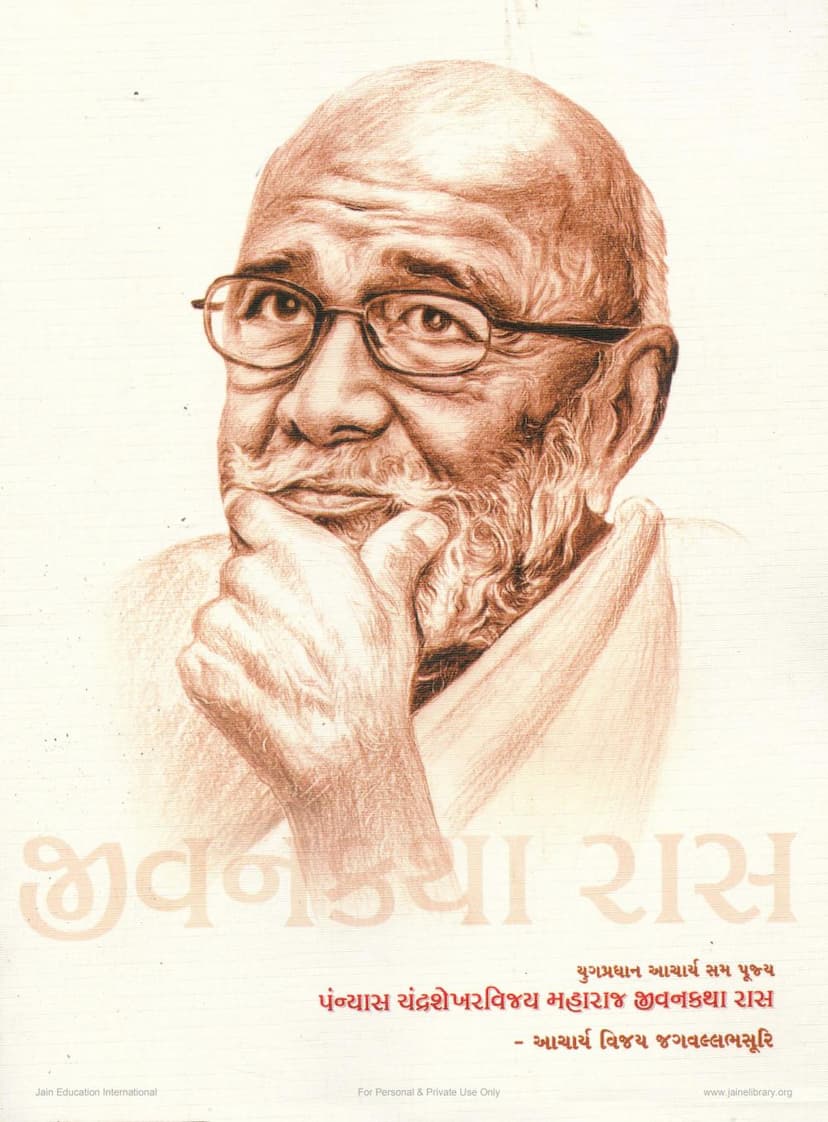Chandrashekharvijay Maharaj Jivan Katha Ras
Added to library: September 1, 2025

Summary
Here's a comprehensive summary of the Jain text "Chandrashekharvijay Maharaj Jivan Katha Ras" by Jagvallabhsuri:
This book is a biographical narrative in verse (Ras) celebrating the life and teachings of Yugpradhan Acharya-sam Panyas Shri Chandrashekhar Vijay Maharaj. Authored by Acharya Vijay Jagvallabhsuriji, a disciple of Acharya Vijay Premsoorishwarji and Acharya Vijay Bhuvanbhanusurishwarji, and follower of Acharya Vijay Dhruvajinsuriji, it is published by Shri Dharmachakra Prabhavak Trust.
The text highlights Maharaj Shri Chandrashekhar Vijay's multifaceted and impactful contributions to Jainism (Jain Shasan). He is described as a beacon of light whose influence illuminated the entire Jain tradition. His life was characterized by:
- Enlightenment and Guidance: He dispelled the darkness of ignorance, guiding the youth towards righteous living.
- Protection of Jainism: His unwavering spirit and inner fire played a crucial role in defending the Jain faith against various challenges.
- Visionary Leadership: His multifaceted talent offered long-term visions and plans for the betterment of the Shasan.
- Powerful Oratory and Transformative Power: His commanding presence and profound way of speaking were likened to a destructive force that cleansed the era's negative influences, vices, and impurities. He embodied the divine trinity of Brahma, Vishnu, and Mahesh in his role as a world uplifter.
Key Aspects of His Life and Teachings Emphasized:
- Emphasis on Inner Qualities and Admiration of Virtues: A central theme is the importance of recognizing and cultivating virtues. Maharaj Shri Chandrashekhar Vijay was a master of observing and appreciating the good qualities in others, which in turn enriched his own soul. This ability to see the good in everyone made him universally loved within the Jain community. He held no enmity towards anyone and never became an enemy to others. He was known for encouraging even the smallest individuals and openly acknowledged his own shortcomings.
- Personal Relationship with the Author: Acharya Vijay Jagvallabhsuriji shares a deep personal connection with Maharaj Shri Chandrashekhar Vijay, having spent years with him in the monastic life and maintained a growing relationship thereafter. He recounts instances of shared experiences, discussions, and even amicable disagreements.
- Dedication and Devotion: Maharaj Shri Chandrashekhar Vijay was deeply devoted to Lord Mahavir, and the author expresses how the concept of "Dharmachakra Tirth" resonated deeply with him.
- Uplifting the Youth: He was instrumental in revitalizing the Jain Shasan by engaging and inspiring the youth through his energetic presence and teachings.
- Advocacy for Indian Culture and Values: The text highlights his strong stance against the erosion of Indian culture and his efforts to preserve its essence. He fearlessly challenged foreign influences and stood as a protector of Bharatiya sanskriti.
- Moral and Spiritual Rejuvenation: He was seen as a spiritual healer, capable of bringing about a profound transformation in individuals through his sermons and teachings. His weekly camps were a source of spiritual awakening for many.
- Devotion to Prabhu's Worship: He encouraged the worship of Lord Prabhu with deep devotion and the observance of eight types of bhavas (spiritual states).
- Compassion and Service to the Needy: He was a friend to the poor, demonstrating immense compassion and working tirelessly to alleviate suffering. This included establishing relief centers, buttermilk centers, and "Khichdi" (rice and lentil) centers to combat hardship.
- Philanthropy and Animal Welfare: During times of drought, he actively participated in activities for the welfare of living beings and raised significant funds to protect animals.
- Educational Initiatives: He initiated programs like children's camps and girls' camps to instill values and character from a young age, creating "Tapoavans" (places of spiritual discipline) for this purpose.
- Preservation of Jain Heritage: He was actively involved in protecting and purifying Jain temples and historical sites.
- Commitment to Principles: He was a staunch upholder of Jain principles and practices, demanding adherence and diligently working to eradicate impurities.
- Acceptance of Faults and Repentance: He did not hesitate to admit his own faults during his discourses, his eyes often filling with tears of sincere repentance.
- Teaching by Example: The text emphasizes that the most effective way to instill values in children is when parents and teachers embody those values themselves.
- His Passing: The narrative recounts the deep sorrow and grief experienced by his disciples and followers upon his demise, describing it as a profound loss. The final rites and cremation are also mentioned.
- Legacy of Virtues: The book concludes with the assertion that true spiritual realization comes from observing virtues, the pursuit of spiritual knowledge, and the grace of the Guru. It underscores that without love for virtues (gunanurag) and their praise (gunanuvad), one cannot attain spiritual heights.
The "Ras" is presented as a humble offering by Acharya Vijay Jagvallabhsuriji, acknowledging his own limitations in fully capturing the greatness of Maharaj Shri Chandrashekhar Vijay. He expresses a sincere desire for all to be imbued with the spiritual energy of the great soul. The text includes prayers and salutations to various revered Gurus in the Jain lineage.